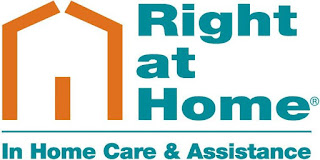Right at Home of Central New Jersey
Wants You to Know About Healthy Aging
The right people, doing the right things,
the right way, for the right reasons.
Right at Home.

Evelyn has arthritis and is living with significant vision loss. But she stays active. She has regular healthcare appointments, goes to exercise class, and works with a physical therapist and low-vision specialist to learn new ways of doing things. "I’m in great health!" she assures her family and friends.
Sandra has similar health challenges. She doesn't get out much anymore. She focuses on her aches and pains. She often feels as if her life is over, and she would describe her health as "poor."
We read so much about "healthy aging" these days. But what is "healthy aging"? What does it mean to "age successfully"? These aren't small questions! According to Columbia University Mailman School of Public Health Dean Linda P. Fried, today 16% of Americans are older than 65, and by 2035, that age group will grow to 20%.
So it's time to re-examine the meaning of "healthy aging," and to support seniors in achieving it. For a long time, the emphasis was on prevention — lowering the risk of disabling and life-limiting health conditions. Prevention is a very important focus, of course. We can improve our odds of avoiding health problems by taking steps such as getting enough exercise, eating well, getting our immunizations and having regular healthcare appointments.
Yet we can do all those things, and still experience health challenges. It might be our genes, or other factors not in our control. We can't say for sure why some seniors will sail through life hardly touched by illness, while others will deal with a whole collection of health problems. But are only the seniors with few health problems experiencing "healthy aging"?
Today, the thinking is changing. Experts point out that our longer lifespan means we have more years to develop health problems. Instead of defining "healthy aging" as an absence of health problems, they say that how we manage our health conditions is the true measure.
Here are some of the key factors in managing health conditions:
Quality healthcare. Many diseases that in the past were inevitably debilitating and even fatal are now manageable — everything from hypertension to arthritis pain to osteoporosis to heart problems. Many seniors are living with one or more chronic illnesses while still feeling pretty healthy! We're encouraged to be active partners in our healthcare by following the doctor's recommendations, managing our medications, and if we have disabilities, learning new ways to do the things we love.
A good support system. People need people, and when a senior is living with health challenges, the help of others makes all the difference. For many people, their spouse, adult children or other family fill that role. And others are creating families of choice, getting help from volunteers, and taking advantage of professional care, which might mean moving to a senior support community or using in-home care services.
A positive attitude. Sandra and Evelyn, above, are good examples — Sandra feels that her life is over, while Evelyn says, "I live a good, fulfilled life." Yes, this is partly a matter of an individual's personality and how they weather difficulty. But we can nurture a better attitude. Seniors who find themselves overwhelmed by negative thoughts should discuss it with their doctor. They may be suffering from depression. Counseling and support groups can help.
Support on all levels for healthy aging
As you were reading about Sandra and Evelyn, did you find yourself judging Sandra for having a negative attitude? Would it make a difference to know that Evelyn has excellent health insurance, a supportive family, accessible housing and a full program of activities at her local senior center — while Sandra does not?
It's easy to tell a person to "take charge" and "have a better attitude." But an individual's circumstances can make doing so that much harder.
On the federal and state levels, adequate funding and innovative senior support services are so important. There's a movement to promote age-friendly communities, and this will be key for the well-being of seniors in the future. Planners have been creating a blueprint of such a community, which includes:
- Good healthcare and the ability to pay for it.
- Community services for seniors.
- Support for people living with dementia.
- Affordable, accessible housing.
- Transportation options.
- Social inclusion, including intergenerational activities.
- Employment or volunteer service opportunities.
- Public spaces that are suited for people of all abilities.
We will all benefit by changing our definition of "healthy aging." The first step is to stop judging seniors by the standards of younger people. Older adults don't face challenges "because they’re old" — instead, the challenges are caused by health conditions. Most of us, if we live long enough, will face those challenges. Putting supports in place for today's seniors will increase our own chances of healthy aging.
About Right at Home - Right at Home is a national organization dedicated to improving the quality of life for those we serve. We fulfill that mission through a dedicated network of locally owned providers of in-home care services.
About Right at Home of Central New Jersey – Right at Home offers in-home companionship and personal care and assistance to seniors and disabled adults who want to continue to live independently. The Right at Home of Central New Jersey office is a locally owned and operated franchise office of Right at Home, Inc., serving the communities of Middlesex and Northern Monmouth Counties.
For more information, contact Right at Home of Central New Jersey at:
(This articles contains copyrighted material originally published on CaringNews.com by Illuminage Communication Partners).










